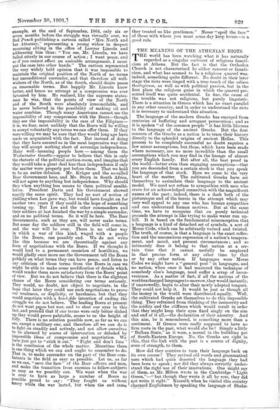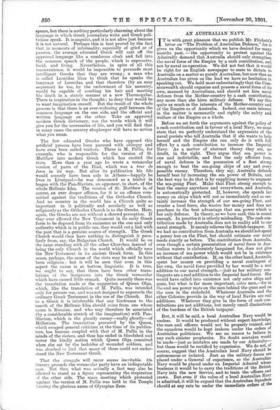THE MEANING OF THE ATHENIAN RIOTS.
THE world has been :watching what it has naturally regarded as a singular outburst of religious fanati- cism at Athens. But the fact is that the Orthodox Church is not characterised by either rancour or fanati- cism, and what has seemed to be a religious quarrel was, indeed, something quite different. No doubt in their later stage the riots were tinged with a true touch of the odium theologieum, as well as with political passion, but in the first place the religious guise in which the quarrel pre- sented itself was quite accidental. In fine, the cause of the trouble was not religious, but purely linguistic. There is a situation in Greece which has no exact parallel in any other country, and in order to understand the riots it is necessary to understand this situation.
The language of the modern Greeks has emerged from centuries of buffeting and arrogant, persecution ; and as it is spoken " of the common people ' has little likeness to the language of the ancient Greeks. But the .first concern of the Greeks as a nation is to trace their history directly to the splendid origins of ancient Hellas.. This process to be completely successful no doubt requires a few minor assumptions, but these, which have been made where necessary, are no more incredible than the knell assumptions which you may find in the lineage of all:host every English family. But after all, the best proof in the world—better even than engaging assumptions—that you are descended from a certain stock is that you speak the language of that stock. Here we come. to 'the very heart of the matter. The cultivated Greeks have set themselves to assimilate their language to the ancient model. We need not refuse to sympathise with men who crave for an acknowledged connection with the magnificent names of the past; indeed, there is a dash both of the picturesque and of the heroic in the attempt which may very well appeal to any one who has human sympathies and can understand human motives. But at the same time, we have to recognise that on purely technical grounds the attempt is like trying to make water run up- hill. It is based on the fundamental misconception that a language is a kind of detached set of symbols, a sort Of Morse Code, which can be arbitrarily turned and twisted. The truth, of course, is that a language is the exact reflec- tion and the unconscious expression of a nation's tempera- ment, and mood, and present circumstances ; and so intimately does it belong to that nation at a' cer- tain time that it cannot usefully be employed in that precise form at any other time by, thit or by any other nation. If languages were Morse Codes we might have a " general post " in languages; and no nation, when once it had mastered the technique of somebody else's language, need suffer a scrap of incon- venience. As a matter of fact, if all the nations of the worldexchanged languages to-morrow, they would instantly, if unavowedly, begin to alter their newly adopted tongues. They could not help it. It would be just as though all the money in the world were distributed equally. Well. the cultivated Greeks set themselves to do this impossible thing. They refrained from thinking of the insincerity and the acidity and the stiffness which would result in order that they might keep their eyes fixed singly on the aim and end of it all,—the declaration of their ancestry. And this aim, be it remembered, is something more than a sentiment. If Greece were really supposed to have no firm roots in the past, w bat would she be ? Simply a little " Balkan State," as it were, a morsel in the bubbling pot of South-Eastern Europe. No, the Greeks are right in this, that the link with the past is a source of dignity, even of strength, to them.
How did they contrive to turn their language back on its own course ? They revived old words and grammatical uses which had quite 'deserted •the language they had been born to speak ; nor did they always correctly under- stand the right use Of their innovations. One might say of- them, as Mr. Hilton wrote in the Cambridge " Light Green,"—" but though they wrote it all by rote, they did not write it right." Kossuth when he visited this country charmed Englishmen by speaking the language of Shake- speare, but there is nothing particularly charming about the language in which Greek journalists write and Greek poli- ticians speak. It is angular, and it is not alive just because it is not natural. Perhaps this is best proved by the fact that in moments of informality, especially of grief or of passion, the average educated Greek will cast off the approved language like a cumbrous cloak and fall into the common speech of the people, which is expressive, lucid, and living. Nevertheless, in spite of all this inconvenience, it would be impossible to persuade most intelligent Greeks that they are wrong ; a man who is called Leonidas likes to think that he speaks the language of Leonidas, and that therefore (by an easy sequence) he too, by the endowment of his ancestry, would be capable of combing his hair and meeting his death in a stately manner at a new Thermopylae. There is inspiration in the thought ; to deny that would be to want imagination oneself. But the result of the whole process is that there is an ever-widening gulf between the common language on the one side, and the official and written language on the other. Take an approved modern Greek dictionary, use the words which it will give you for the necessaries of life, and you will find that in many cases the country shopkeeper will have no notion what you mean.
The few educated Greeks who have opposed this artificial process have been pursued with obloquy and have even been called traitors. There is M. Pella, for example, who is responsible for the version of St. Matthew into modern Greek which has excited the riots. More than a year ago he wrote a vernacular version of parts of the Iliad, which was a tour de force in its way. But after its publication his life would scarcely have been safe in Athens—happily he lives in Liverpool—he was denounced as a traitor in league with the Pan-Slavists, an opponent, in short., of the whole Hellenic Idea. The version of St. Matthew is, of course, an ever deeper offence, for it is an offence com- mitted against the traditions of the Orthodox Church. And no country in the world has a Church quite so important to it politically and secularly as well as religiously as the Orthodox Church is to the Greeks. Here, again, the Greeks are not without a shrewd perception. If they ever allowed the New Testament in its early Greek form to be deposed from its eminence as the one and only authority which is in public use, they would cut a link with the past that is a genuine source of strength. The Greek Church would then have nothing to distinguish it pecu- liarly from, say, the Bulgarian Church. It would be on the same standing with all the other Churches, instead of being the only Church in the world which officially uses the New Testament in its ancient Greek form. In this sense, perhaps, the cause of the riots may be said to have been religious ; but it will be seen that even in this aspect the cause is at bottom linguistic. It is true, we ought to say, that there have been other trans- lations of the Scriptures into the Greek vernacular which have caused little remark. Quite recently there was the translation made at the suggestion of Queen Olga, which, like the translation of M. Pallis, was intended only for private use, and was not designed to supersede the ordinary Greek Testament in the use of the Church. But to a Greek it is intolerable that any hindrance to the march of the Hellenic Idea should come from one whose name is Russian, and who may therefore be associated (by a considerable stretch of the imagination) with Pan- Slavism, which is the ghostly enemy—really ghostly—of Hellenism. The translation procured by the Queen, which escaped general criticism at the time of its publica- tion, has become coupled with that of M. Pallis in the minds of the rioters, and thus has ended in bloodshed and terror the kindly notion which Queen Olga conceived when she sat by the bedsides of wounded soldiers, and was shocked to by that many of them could not under- stand the New Testament Greek.
That the struggle will recur seems inevitable. On literary grounds the vernacular party have an indisputable case. But then what was actually a fact may also be allowed to stand as a figure representing the inspiration of the other side. The mass meeting which protested against the version of M. Pallis was held in the Temple bearing the glorious name of Olympian Zeus.















































 Previous page
Previous page